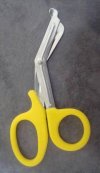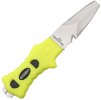- Joined
- May 16, 2010
- Messages
- 9,347
I am not sure I can add much to the wealth of info here, but I have done a lot of diving and spent some time living on a boat. I used a titanium blade, and would not recommend it. But there are some feature that I have found useful. Having a blunt tip is a requirement for me, and my knife has a plain edge on one side with a gut hook/line cutter and serrations on the other. The serrations are useful when you have to cut through rope or kelp, but the line cutter is hopeless. Having a metal pommel is a big plus, so you can bang your tank and signal pretty well underwater if you need to. The other thing that really matters is the sheath; having clip-in retention that can hang upside down and never worry you about falling out or moving position is great. Even more than on the street, having a dive knife exactly where it should be is important to me.
But a dive knife gets beaten up. I have scraped with the tip, torn through rope, cut coconuts, etc.. so spending a ridiculous amount of money may not be the best way to go. Mora makes GREAT knives (but carbon steel and salt water might be problematic..), though I am not sure any are blunt tip. As long as you keep it very clean, 'rust-proof ' may not be necessary by any means. That said, I have hear great things about H-1 (okay I am a spydernut) and might check out their knives, but they don't have a perfect dive knife to me.
Basically, H-1, n690, or titanium might be better for rust, but if you clean your knife, it is not really a big deal. After that, some serrations, a pommel, a bright color handle, and a good sheath are my priorities. I am looking to replace my old Ti one for a dive trip this winter, and will let you know if I find the perfect model. But whatever I get, I will keep it cheap enough that if it doesn't make it home, it is not the end of the world, so long as it doesn't fail on a dive. An the type of diving matters too; If you are in a kelp forest or doing some technical diving, it might affect for your choice compared to a 50 foot open reef dive.. just my.02
You've used a ti knife and would not recommend it, but you fail to say why!?? (No offence, but not really the way to engage in a debate, if you'll permit me to say so).
....not that you really need to tell us why; the vast majority of ti knives and not made of BETA ti, as that is notoriously hard to work and few companies do it.
Sadly, the reputation of ti knives have suffered as a result. I bet that your ti knife didnt hold an edge well and was difficult for you to sharpen.
I further more bet, it wasnt BETA ti.
Second highlight: I have a difficult time settling for a cheap knife just because its cheap and I might inadvertantly drop it and not find it again. I would gladly use my ti salt water knife for the tasks you mention. Its a hard use knife and is up to hard work with no problems what so ever.
Third and fourth highlight: Ive had a 'rust resistant' Blackie Collins design knife in my kayaking vest prior to switching to BETA ti and the 'rust resistant' knife got rust spots even though the vest and knife didnt get submerged in salt water on every outing with the kayak and even though it got rinsed with fresh water and cleaned religiously after each use and also got oiled.
So called 'stainless' knives WILL eventually develop some kind of rust - at least in my neck of the woods.
Bottom line; use what ever you want to. But this is a knife forum and we are here because we like our knives and that includes specialized knives made for a purpose and not just cheapos (I like some cheapos as well - just not for serious use around the water. Thats just me - to each his own blah, blah blah).








